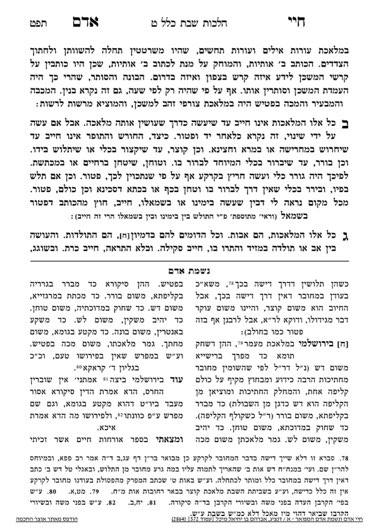We are beginning siman 3, where the Chayei Adam discusses the concept of avos and toldos. The Torah tells us that we cannot do melacha on Shabbos, and also writes, right afterwards, that we cannot build the Mishkan on Shabbos. Thus. Chazal conclude that the melachos involved in making the mishkan are those prohibited on Shabbos. Chazal give us 39 melachos which were involved in making the miskhan.
Just like other halachos of the Torah, the concept of kal vachomer and mah matzinu apply here. At face value, if the Torah teaches us a halacha in a specific instance, logically it should be limited to that place. However, halacha leMoshe miSinai teaches us that some halachos are paradigms which can be extrapolated to other places. This is the source for the concept of kal vachomer and mah matzinu, which is Hashem giving us that permission and responsibility to use our own logic to extrapolate from one set of halachos to another. Otherwise, it would remain local to the place in which it is written.
The only difference between something derived through a kal vachomer or mah matzinu and something explicit is the concept of ain onshin min hadin, we cannot punish someone based on a kal vachomer or mah matzinu, only based on an issur explicit in the torah. When it comes to the melachos of Shabbos, the language of avos and toldos refer to the primary source for the issur (avos) and various derivatives extrapolated from or related to the av (toldos). If so, there would be no punishment for violating a toldah. However, the Gemara learns from the pasuk of mei’achas mei’heinah that toldos are explicitly delineated as assur in the Torah, so there can be a punishment for them as well
The only practical difference between an av and toldah is when they are performed together.
Generally, if a person performs the same aveirah multiple times without realizing it is assur (shogeig), they are liable to one korban. This is known as he’elem echad. If a person forgets it is Shabbos, and performs multiple melachos, such as cooking, sewing, and tearing, they have transgressed the issur of lo saaseh kol melacha (performing melacha on Shabbos), and one would think they are only chayav once. However, if the person forgot the melachos, the Gemara concludes that each type of melacha is chayav its own korban. In our example, they would bring three different korbanos, even though they are all of the same issur of lo saaseh kol melacha.
If a person performs the same melacha twice b’shogeig, such as sewing 50 stitches, they are only chayav one korban, because it is the same melacha, as in other halachos.
If one transgresses both an av and one of its toldos, it is a machlokes how many korbanos a person brings. Rabi Eliezer holds it is two different issurim, so one brings two korbanos. The Chachomim hold they are the same issur, so one korban is brought for both. Since the toldah is a derivative of the av, it is as though one performed the av twice.
Be’ezras Hashem, when moshiach comes, we will again bring korbanos, including for all of the issurei Shabbos which we transgressed, and we will need to know these halachos on a practical level.
Summary
- An av is the primary source of a Shabbos melachah, and a toldah is its derivatives.
- The practical application of the avos and toldos of Shabbos is that if one trangresses melachos b’shogeig, they bring one korban per av melacha transgressed, and the toldos are subsumed under the av transgressed.



